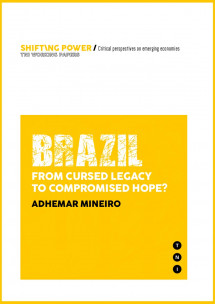Brazil: From Cursed Legacy to Compromised Hope?
Temas
Regiones
Brazil provided perhaps the best hope for social movements that the rise of emerging economies might offer new opportunities for progressive economic and social transformation, but 12 years after Lula's election the alliance between social movements and Brazil seems much more fraught with tension.

Descargas
Autores
Transnational Institute’s (TNI) Shifting Power Working Paper Series seeks to help movements navigate our changing multipolar world as well as provide an invaluable source of alternative analysis for students, analysts and journalists.
Brazil, From Cursed Legacy to Compromised Hope?
Brazil provided perhaps the best hope for social movements that the rise of blocs like IBSA or BRICS might offer new opportunities for progressive economic and social transformation in our globalised world. This is because Brazil’s emergence as a global power coincided with the ascendency to power of a former trade unionist, Luiz Inácio ‘Lula’ da Silva, and his Workers Party, known for its close relationships with social movements.
This hope was best exemplified in the World Social Forum, first held in Porto Alegre in 2001. Not only did these annual summits, attended by tens of thousands of activists, give visibility to an alternative globalisation movement—which the New York Times would later dub the ‘world’s second superpower’-—they were also sponsored and supported by municipalities and other government bodies successfully run by the Workers Party. For a while Lula, once he was elected President in 2003, seemed to live up to the hopes social movements placed in him—helping break with the Free Trade Agreement of the Americas (FTAA), calling for a multipolar world in rejection of US domination, and promising a new development path based on ending poverty and inequality.
Yet 12 years later, the alliance between social movements and Brazil seems much more fraught with tension. Domestically, the Brazilian government under President Dilma Rousseff faced unprecedented opposition from a popular movement angry at corruption and exorbitant spending in preparation for the FIFA World Cup. Internationally, accusations of Brazilian ‘imperialism’ are heard ever more often from social movements in neighbouring countries confronting Brazilian transnational companies and investments. Why is this, and what hope is there for Brazil forging a more progressive path in a multipolar world?